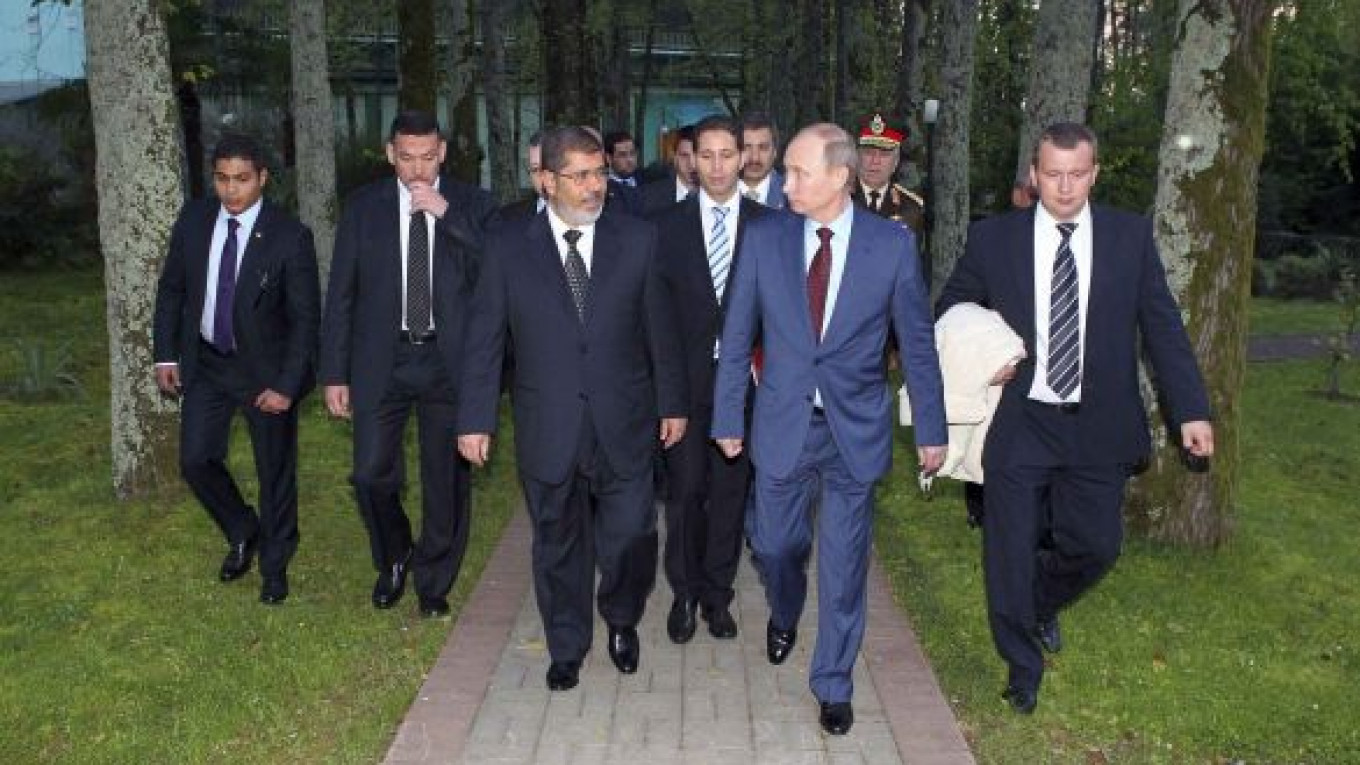Egyptian President Mohamed Morsi told his Russian counterpart Vladimir Putin that he wanted to create a strong political union with him, he but failed to secure a loan necessary for Egypt's troubled economy during his first visit to Russia Friday.
Morsi, who was elected president in June 2012 after the ouster of authoritarian leader Hosni Mubarak, told Putin that his country was interested in having strong economic and political ties with Russia.
"In the political sphere, we are aiming to establish a real union with the Russian Federation, and in the economic sphere, there are many projects we would like to develop with you," Morsi said in opening remarks at a meeting with Putin.
Morsi's main aim was to obtain a loan that a Moscow-based source estimated at $2 billion, Reuters reported Friday.
Egypt's attempt last week to get a $4.8 billion loan from the International Monetary Fund did not yield any results, although both sides said they would continue their negotiations.
Egyptian Trade and Industry Minister Hatem Saleh, who accompanied Morsi, said Russia and Egypt "have reached no conclusion on that loan," Reuters reported.
Bilateral relations suffered a setback after the 2011 revolution in Egypt, a popular destination for Russian tourists. Putin said he was "surprised" that the flow of Russian tourists to Egypt increased 35 percent in 2012.
Putin said Morsi's visit was "a restoration of relations," adding that Russian-Egyptian trade amounted to $3 billion annually.
Morsi is trying to gain support for his policies in Russia, but he will find it difficult because the two countries have different positions on the Syrian civil war, said Shamil Sultanov, head of the Russia-Islamic World think tank.
Russia supports Syrian President Bashar Assad, while Morsi favors the opposition to his regime.
"In the case of Syria, Morsi is on the other side of the barricades," Sultanov said.
But Theodore Karasik, an expert at the INEGMA think tank in Dubai, said the Kremlin might use Egypt's requests for aid to further its foreign policy objectives.
"The Kremlin could do quite well for itself by giving aid to Egypt at this time, given the deterioration in Syria. As Syria moves towards a new future, it would be prudent for Moscow to be close to Cairo," he said.
Morsi, who had earlier praised Egyptian President Gamal Abdel Nasser for forging strong ties with the Soviet Union, proposed that Russian companies modernize facilities built with Soviet assistance in the 1960s-1970s. These include steel plants and the Aswan Dam on the Nile River.
Russian businesses will be interested in taking part in those projects, but the Kremlin still doubts that Morsi's administration will work with Russia as efficiently as the Mubarak regime, Sultanov said.
Contact the author at [email protected]
A Message from The Moscow Times:
Dear readers,
We are facing unprecedented challenges. Russia's Prosecutor General's Office has designated The Moscow Times as an "undesirable" organization, criminalizing our work and putting our staff at risk of prosecution. This follows our earlier unjust labeling as a "foreign agent."
These actions are direct attempts to silence independent journalism in Russia. The authorities claim our work "discredits the decisions of the Russian leadership." We see things differently: we strive to provide accurate, unbiased reporting on Russia.
We, the journalists of The Moscow Times, refuse to be silenced. But to continue our work, we need your help.
Your support, no matter how small, makes a world of difference. If you can, please support us monthly starting from just $2. It's quick to set up, and every contribution makes a significant impact.
By supporting The Moscow Times, you're defending open, independent journalism in the face of repression. Thank you for standing with us.
Remind me later.






